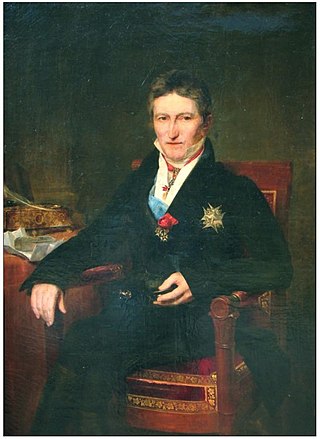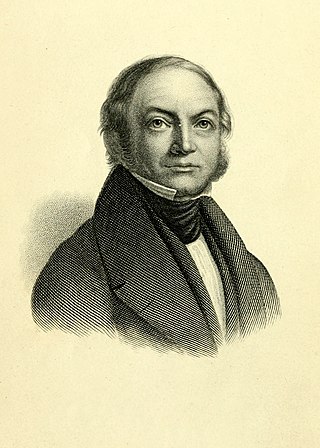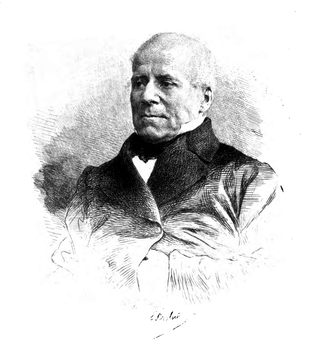
The Bourbon Restoration was the period of French history during which the House of Bourbon returned to power after the first fall of Napoleon on 3 May 1814. Briefly interrupted by the Hundred Days in 1815, the Restoration lasted until the July Revolution of 26 July 1830. Louis XVIII and Charles X, brothers of the executed King Louis XVI, successively mounted the throne and instituted a conservative government intended to restore the proprieties, if not all the institutions, of the Ancien Régime. Exiled supporters of the monarchy returned to France but were unable to reverse most of the changes made by the French Revolution. Exhausted by decades of war, the nation experienced a period of internal and external peace, stable economic prosperity and the preliminaries of industrialization.

Ussé is a castle in the Indre-et-Loire département, in France. The stronghold at the edge of the Chinon forest overlooking the Indre Valley was first fortified in the eleventh century by the Norman seigneur of Ussé, Gueldin de Saumur, who surrounded the fort with a palisade on a high terrace. The site passed to the Comte de Blois, who rebuilt it in stone.

Isidore Marie Auguste François Xavier Comte was a French philosopher, mathematician and writer who formulated the doctrine of positivism. He is often regarded as the first philosopher of science in the modern sense of the term. Comte's ideas were also fundamental to the development of sociology; indeed, he invented the term and treated that discipline as the crowning achievement of the sciences.

Antoine Louis Claude Destutt, comte de Tracy was a French Enlightenment aristocrat and philosopher who coined the term "ideology".

Jacques Nicolas Augustin Thierry was a French historian. Although originally a follower of Henri de Saint-Simon, he later developed his own approach to history. A committed liberal, his approach to history often introduced a romantic interpretation, although he did engage in research of primary sources. He nevertheless was recognised as a significant historian of the evolution of communal governance.

Jean-Baptiste Guillaume Joseph Marie Anne Séraphin, 1st Count of Villèle, better known simply as Joseph de Villèle, was a French statesman. Several times Prime minister, he was a leader of the Ultra-royalist faction during the Bourbon Restoration.

Claude Henri de Rouvroy, comte de Saint-Simon, better known as Henri de Saint-Simon, was a French political, economic and socialist theorist and businessman whose thought had a substantial influence on politics, economics, sociology and the philosophy of science. He was a younger relative of the famous memoirist the Duc de Saint-Simon.

Joseph Marie, comte de Maistre was a Savoyard philosopher, writer, lawyer, and diplomat who advocated social hierarchy and monarchy in the period immediately following the French Revolution. Despite his close personal and intellectual ties with France, Maistre was throughout his life a subject of the Kingdom of Sardinia, which he served as a member of the Savoy Senate (1787–1792), ambassador to Russia (1803–1817), and minister of state to the court in Turin (1817–1821).

Denis-Antoine-Luc, comte de Frayssinous was a French prelate and statesman, orator and writer. He was the eighth member elected to occupy Seat 3 of the Académie Française in 1822.

Louis Gabriel Ambroise, vicomte de Bonald was a French counter-revolutionary philosopher and politician. He is mainly remembered for developing a theoretical framework from which French sociology would emerge.
The Ultra-royalists were a French political faction from 1815 to 1830 under the Bourbon Restoration. An Ultra was usually a member of the nobility of high society who strongly supported Roman Catholicism as the state and only legal religion of France, the Bourbon monarchy, traditional hierarchy between classes and census suffrage, while rejecting the political philosophy of popular will and the interests of the bourgeoisie along with their liberal and democratic tendencies.

Charles Alexandre Lesueur was a French naturalist, artist, and explorer. He was a prolific natural-history collector, gathering many type specimens in Australia, Southeast Asia, and North America, and was also responsible for describing numerous species, including the spiny softshell turtle, smooth softshell turtle, and common map turtle. Both Mount Lesueur and Lesueur National Park in Western Australia are named in his honor.

Charles (Karl) Theodor Christian Friedrich Follen was a German poet and patriot, who later moved to the United States and became the first professor of German at Harvard University, a Unitarian minister, and a radical abolitionist. He was fired by Harvard for his abolitionist statements.

Charles DunoyerBarthélemy-Charles-Pierre-Joseph Dunoyer de Segonzac, better known as Charles Dunoyer, was a French economist of the French Liberal School.
HMS Bedford was a Royal Navy 74-gun third rate. This ship of the line was launched on 27 October 1775 at Woolwich.
François-Charles-Louis Comte (1782–1837) was a French lawyer, journalist and political writer.

Joseph Mérilhou was a French lawyer, magistrate and politician. He was Minister of Public Education and Religious Affairs, and then Minister of Justice in the Cabinet of Jacques Laffitte.

Christophe André Jean de Chabrol de Crouzol was a French politician who served in the administration of Napoleon, then adhered to the Bourbon Restoration in 1814. As Prefect of Rhône he acquiesced in brutal reprisals in 1817 against former supporters of Bonaparte. He was an elected deputy from 1820 to 1822, then was made a peer of France. He served as Minister of the Navy (1824–29) and as Minister of Finance (1829–30). Chabrol resigned before the July Revolution of 1830, unwilling to remain associated with the increasingly repressive government, but remained a supporter of the Bourbon monarchy.

Marc-René de Voyer de Paulmy d'Argenson (1771–1842), a member of the French Chamber of Deputies. D'Argenson was a grandson of Marc-Pierre, Count d'Argenson. He was a prefect of Deux-Nèthes from 1809 to 1813. As a member of the Chamber of Dueputies during the Hundred Days in 1815, he was a member of the French deputation to the allies to obtain the exclusion of the Bourbons. After the second restoration of Louis XVIII he was often elected as a member of the Chamber of Deputies and voted with the opposition.
Joseph-François-Nicolas Dusaulchoy de Bergemont was a French playwright, writer and journalist.
















